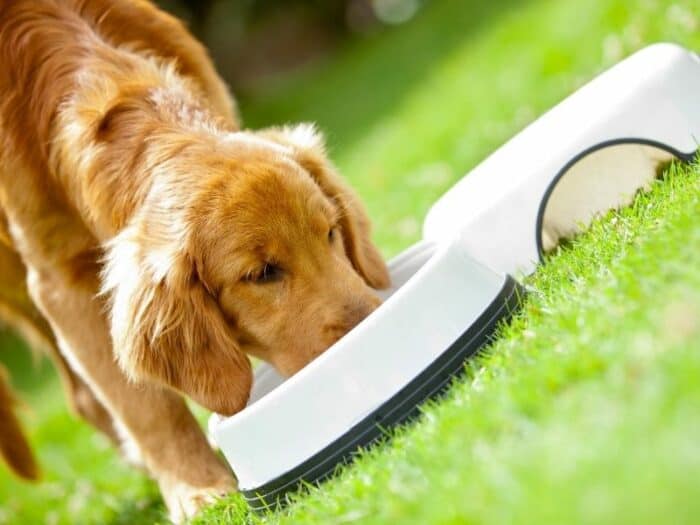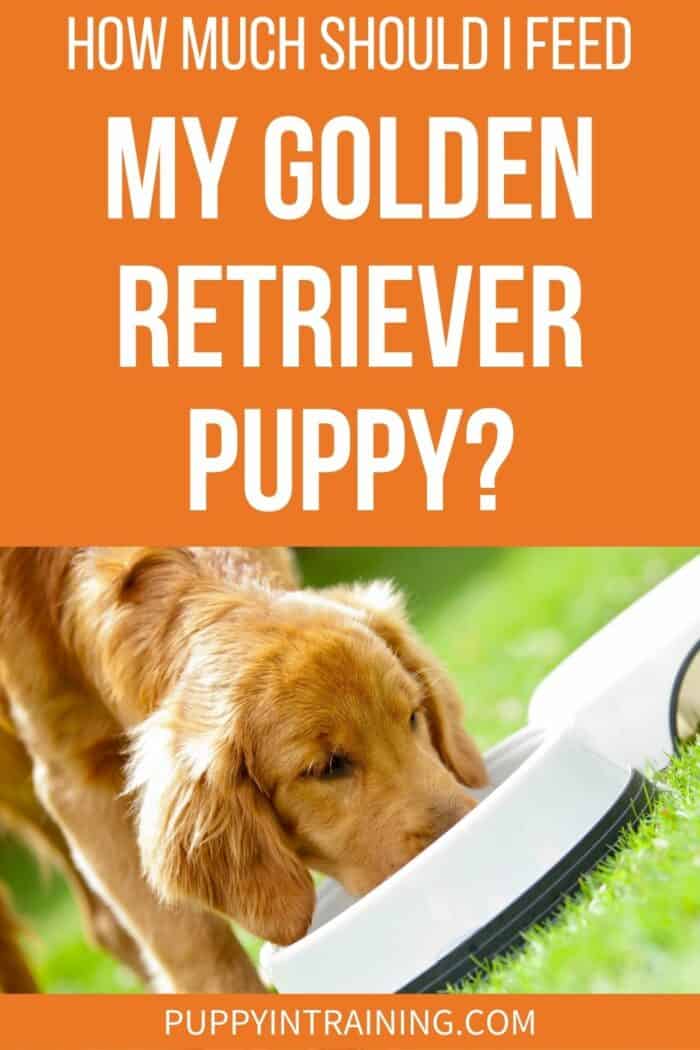How Much Should I Feed My Golden Retriever Puppy? [Food Chart and Feeding Guidelines]
This post may contain affiliate links. We may earn money or products from the companies mentioned in this post.
We all want our golden retriever puppies to be healthy and happy.
We envision them running through a verdant field chasing a ball.
Full of energy with the beautiful, lustrous golden coat.
But, just like us, eating the proper food in the proper amounts will help your golden properly grow and thrive.

After all, what we eat impacts how healthy we are.
How much you should feed your golden retriever puppy will vary depending on the quality of food you feed, his age, his weight, his general health, and his activity level.
Your golden will be growing for up to two years. And the amount of food during that time will have to be adjusted depending on his needs.
In this article, I’ll provide some general guidelines for you to follow. Because most people feed kibble to their pups, this article will focus on that.
Kibble is convenient and cost-effective. Any food that meets AAFCO standards provides basic nutritional requirements.
Golden retriever puppies shouldn’t appear like chubby bears. Instead, they should be lanky and full of energy.
They should love to eat their food with gusto.
A puppy’s too skinny if you can see his ribs. Instead, you should be able to feel his ribs when you pet him there.
There should just be a thin coating of fat under his skin.
If you can’t feel his ribs, he’s probably too chunky, and either the amount of food you give him should be adjusted or his exercise should be increased–or both.
And he should have a defined waistline.
Of course, you should check with your veterinarian to make such adjustments.
And remember a young puppy should get only so much exercise a day.
Their joints and bones are developing and can be damaged if the exercise is too extreme.
How Often You Should Feed Your Golden Puppy
A puppy should remain with his littermates and mother until he’s eight weeks old.
Assuming you have an eight-week-old puppy, he should receive three to four meals a day. So you’ll split the amounts suggested into each daily feeding at the same scheduled intervals every day.
Feeding at the same times every day will help the puppy’s ability to digest his food and for him to have a source of energy throughout the day.
From eight weeks old until about five or six months old, three meals per day are advisable. Of course, feed at the same intervals every day and split the total amount per day in half to be given at each feeding.
After about six months of age through adulthood, two feedings per day are the norm.
Always check with your vet regarding how much and how often to feed. These are just guidelines.
Feed him at the same distraction-free location so that he can focus on eating. As much as goldens love to eat, a young golden puppy is also very easily distracted.
Give him about 15 or 20 minutes to eat, then pick up any food that’s left. Most puppies will learn to eat while the food’s down.
If he misses a couple of meals and has no interest in the food, consult with your vet to determine whether anything’s wrong.
Don’t free-feed your golden retriever puppy. If you leave the food down all the time, he’ll probably overeat and become overweight.
This can lead to possible health problems, including joint and bone problems. Goldens can easily become overweight.
Also, if you always leave his food in his bowl on the floor, you won’t be able to properly house-train him because you won’t be able to anticipate when he has to defecate.
Free feeding can also lead to a picky eater. Some puppies figure out that if their buffets are always there, and they can just go graze at will.
How Much To Feed A Golden Retriever Puppy [Guidelines]
As is true with feeding any dog, what type of food you feed your dog will help you decide how much to feed. Most foods you purchase will have guidelines on their bag or box.
When you first get your puppy, feed him the same food that the breeder or rescue fed him for a few weeks. Then, if you want to change his food, do so over at least 10 days.
Add more of the new food and subtract more of the old food each day.
After about five days, you should be giving him approximately 50 percent of the new food and 50 percent of the old food. Continue adding new and subtracting old food until he’s eating all the food you’ve chosen.
Switching food over such a period of time will help prevent stomach upsets and diarrhea.
Feeding Amounts By The Puppy’s Age
The following amounts are suggested by many golden retriever breeders and other knowledgeable people:
- Two-month-old puppy should be fed about 1 ½ cups per day
- The three-month-old puppy should be fed about 2 cups per day
- Four-month-old puppy should be fed about 2 ½ cups per day
- Five-to-six-month-old puppy should be fed about 3 cups per day
- Six-to-seven-month-old male puppy should be fed about 3 ½ to 4 cups per day (female pups about 3 cups per day)
- The eight-month-old puppy should be adjusted depending on his growth.
Throughout his first two years, while he’s growing, the amount of food you feed will have to be modified depending on his growth and growth spurts.
Overfeeding will result not only in him becoming overweight but it will also make him grow too fast.
Periodically–even weekly– test whether you can still feel his ribs without them protruding.
Another gauge regarding when to increase his food allotment is if he’s finishing all of his kibble at two out of three meals. You can then increase the amount he eats.
You should also feed his last meal of the day at least 90 minutes before his bedtime so that he can digest his food and potty before bed.
Don’t give him any supplements unless your vet says to do so.
A well-balanced, high-quality food should provide all the nutrients he requires.
Golden puppies require a formula made for large-breed dogs.
You don’t want your pup to grow too fast and suffer health problems. Puppy formulas for large-breed dogs regulate their growth.
What To Do If Your Golden Eats Too Fast
What if your goldens are still hungry after eating? As long as his weight and health are fine, don’t give in to those pleading puppy eyes.
Goldens are generally eating machines and won’t regulate the amount of food they ingest.
If he eats too quickly, you can buy a bowl that’s like a maze or puzzle to slow him down. There’s also a stainless steel ball you can buy that you put into his current food bowl to slow him down.
Eating too quickly can lead to digestive upsets and even bloat, which can be deadly.
I rescued my golden retriever Riley when he was about six months old.
To say that he ate as if it were his last meal would be an understatement. He had a voracious appetite.
I bought one of the maze bowls to slow him down. The kibble is placed between each section of the bowl, and he had to forage for his food.
It worked! He ate at a more normal pace. And he didn’t have any stomach upsets.
Of course, dogs should be given free access to fresh water. But it’s inadvisable for them to drink large amounts right after or before eating as they may bloat.
Other Feeding Options
Although I concentrated in this article on feeding kibble to your new puppy, there are other options.
There are some drawbacks to them because they may not be nutritionally complete, may be cost-prohibitive, or maybe too time-consuming to make.
Wet Food
Canned food alone or mixed with kibble is an option. But wet food alone is very expensive.
If you plan to change over to kibble at some point, your puppy may not eat it because it’s not as enticing. He may become a picky eater.
Also, you’d have to give a lot of wet food to be sure that he has the proper nutrients. And he’ll have to potty more often because of the bulk amount of moisture in the food.
Raw/BARF Diet
BARF stands for biologically appropriate raw food or bones and raw food. Feeding raw is controversial.
Some vets say it doesn’t provide proper nutrients and that bacteria in the raw bones or meat can pose a health hazard to dogs and their humans.
The bones can also pose a choking hazard, can break teeth, or can puncture a dog’s intestines.
Dehydrated raw foods reduce some of the risks.
However, all experts agree that puppies should not be fed a raw/barf diet.
The ratio of calcium to phosphorous is crucial to puppy development. It’s almost impossible to get that ratio exactly right with a raw diet.
Homemade Diet
Cooking for your best friend can be very appealing. And many people do.
You know what ingredients and their quality are.
But it has its drawbacks. It’s hard to know whether the food you make is nutritionally complete.
Of course, you can use a recipe that’s been created or approved by a veterinary nutritionist. And you can add supplements that expert approves to add to your pup’s diet.
Another drawback is that it’s very time-consuming to create a diet for a large-breed puppy.
I’ve always fed a nutritionally complete commercial kibble to my dogs. And they’ve been healthy on it.
Of course, I’ve extensively researched the foods they’ve eaten.
Final Thoughts
In order to be sure that your golden puppy is being fed an appropriate food so that he develops properly and is healthy, make sure that it’s nutritionally balanced and developed for large-breed puppies.
Of course, the amount you feed is important for his growth rate and general health and well-being.
But there is no one-size-fits-all in determining how much to feed a golden retriever puppy.
Any amounts you see are just guidelines. Adjust them as necessary regarding your own special puppy.
Do you have a golden retriever puppy?
How did you determine what and how much to feed him?
Please leave your comments in the section below.
Save To Pinterest

Top Picks For Our Puppies
- BEST DOG CHEW
We Like: Beef Collagen Sticks - All of our pups love to bite, nip, and chew. We love using Collagen Sticks to help divert these unwanted behaviors. - BEST PUPPY TOY
We Like: Calmeroos Puppy Toy w/ Heartbeat and Heat Packs - Perfect for new puppies. Helps ease anxiety in their new home. - BEST DOG TREATS
We Like: Crazy Dog Train-Me Treats - We use these as our high-value treats for our guide dog puppies. - BEST FRESH DOG FOOD
We Like: The Farmer's Dog - A couple months ago we started feeding Raven fresh dog food and she loves it! Get 50% off your first order of The Farmer's Dog.
Check out more of our favorites on our New Puppy Checklist.
How much is 1 cup in gms or ml?
Congratulations on your new puppy! Your puppy is very young. You should talk to your vet about the proper amount of food to feed your puppy. FYI, most of my puppies eat very fast no matter how much food you give them.
Sir my pup is 1 month 10 days old. He is given pedigree 2 times a day. 45 tablet with 1 1/2 teaspoon cerelac with very small amount of gutwell. he eats very fast. Should we increase his food or not